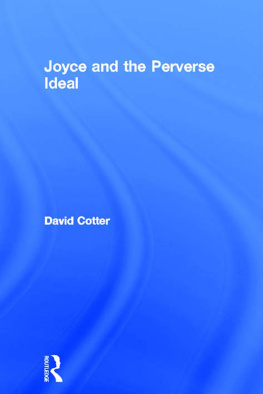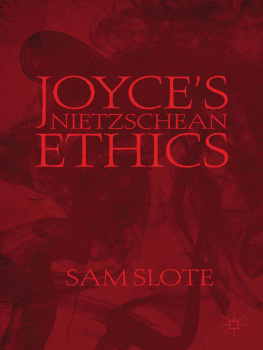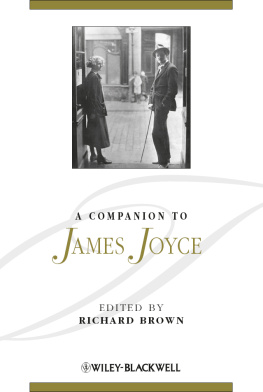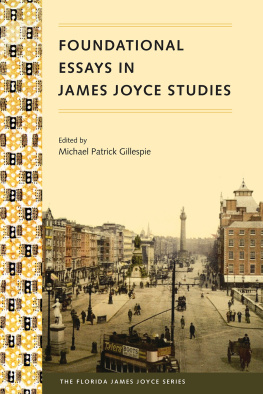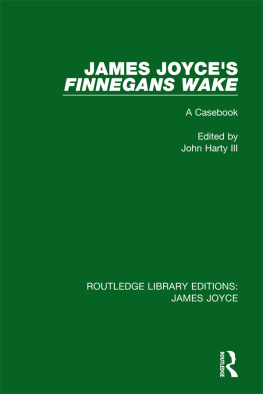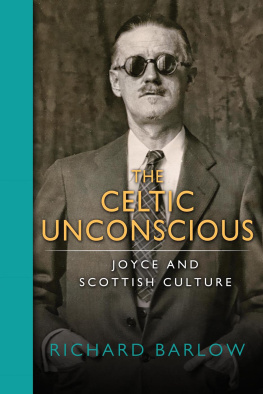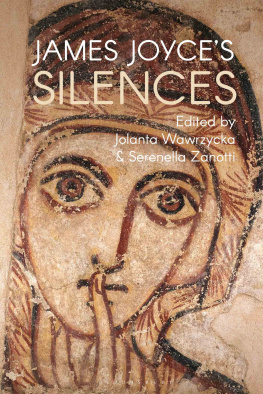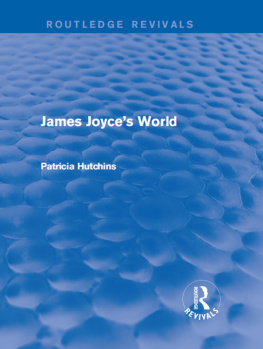James Joyce
Andrew Gibson

REAKTION BOOKS
Titles in the series Critical Lives present the work of leading cultural figures of the modern period. Each book explores the life of the artist, writer, philosopher or architect in question and relates it to their major works.
In the same series
Michel Foucault
David Macey
Jean Genet
Stephen Barber
Pablo Picasso
Mary Ann Caws
Franz Kafka
Sander L. Gilman
Guy Debord
Andy Merrifield
Marcel Duchamp
Caroline Cros
Frank Lloyd Wright
Robert McCarter
Jean-Paul Sartre
Andrew Leak
To Rory
Published by Reaktion Books Ltd
33 Great Sutton Street
London ECIV ODX , UK
www.reaktionbooks.co.uk
First published 2006
Introduction copyright Declan Kiberd 2006
Main text copyright Andrew Gibson 2006
All rights reserved
No part of this publication may be reproduced, stored in a retrieval system, or transmitted, in any form or by any means, electronic, mechanical, photocopying, recording or otherwise, without the prior permission of the publishers.
Page references in the Photo Acknowledgements and Index match the printed edition of this book.
Printed and bound in Great Britain
by Cromwell Press, Trowbridge, Wiltshire
British Library Cataloguing in Publication Data
Gibson, Andrew, 1949
James Joyce. (Critical lives)
1. Joyce, James, 18821941 2. Joyce, James, 18821941 Criticism and
interpretation 3. Authors, Irish 20th century Biography
4. Politics in literature 5. History in literature
I.Title
823.912
ISBN : 1 86189 277 2
Contents
Introduction
Declan Kiberd
How did a city as sleepy and provincial as Dublin in the early twentieth century generate the extreme modernity of forms to be found in the writings of Yeats, Beckett or, most of all, Joyce? One answer might be that a colony is always a laboratory in which new methods are put to the test. Another might be to suggest that Irish artists had no superstitious investments in traditional English forms, which they felt quite free to pulverize. These analyses were explored with a sort of dignified audacity in Andrew Gibsons magisterial Joyces Revenge, a book that helped to illustrate the ways in which Ulysses might have constituted a Fenian attack on English cultural values. That such a study had been propounded by a leading English intellectual added a delicious layer of irony, much savoured in Ireland. Gibsons patient and richly detailed historical analysis itself in the best traditions of British empiricism helped to explain why the writers of his own country had found it so difficult to come to terms with Joyce.
In this intrepid new book, Andrew Gibson extends that investigation. Past biographers have assumed that Joyce became European and modern to the extent that he transcended his Irishness, but what if that story were to be told the other way around? Gibson assumes that to have been born Irish in 1882 was to have been modern anyway: rather than mapping elements of Joyces life in continental Europe back onto the native island, he boldly takes the Ireland of Joyces youth as a test-case for the modern world. He works outward from that spot, as did Joyce himself. Gibsons artist is no languid aesthete or trifler with forms, but a man with a mission to explore the ways in which he might liberate himself from all constricting codes, political, religious or artistic. The brilliantly innovative reading of Exiles, Joyces only play, is but one vivid illustration of that search.
Joyce went global, avers Gibson, before the world did. If imperialism was itself a worldwide affair, then so also was the system of resistance. Parnell and de Valera became models for a Nehru or a Gandhi, as surely the politics of economic boycott became (in Joyces own words) the highest form of warfare. Gibson rightly contends that the global Joyce of postcolonial theorists is therefore an expression of the Irish experience rather than a release from it: but his project is also to challenge the merely internationalist Joyce still beloved of Parisian intellectuals, metroMarxists and North American professors with a more Hibernian type of thinker. He explains very well how Joyce himself connived for short-term tactical reasons in the international sensation of Ulysses, providing early commentators with the Homeric analogies so that the readers baffled by the sheer density of Dublin detail might find comfort in the thought that the core of the book was its European theme.
Throughout this luminous study, Gibson insists on Joyce as an example of the artist as thinker. His Joyce was a critic long before he became a poet or novelist. Taking a surprising but apposite cue from Joyces comments on George Meredith, Gibson shows how Ulysses is one of those novels that might also be read as a philosophical essay.
The strength of Gibsons scholarship lies in his confident grasp of the social, intellectual and religious details of Anglo-Irish history, science and material culture out of which Joyces work sprung. Much of his research was done in the decades when Irish scholars brave enough to proclaim Joyce an anti-colonial author were likely to be accused of assimilating his work to the campaigns of the IRA .
Gibson, who remarks astutely on how good the English have been at concealing from themselves the effects of their own colonial violence, is only too well aware of how many Irish intellectuals have become ashamed of their own patriots as once they were of their greatest writers. The irony of this project is that is has taken an Englishman to restore to us a fully Irish Joyce-as-modernist. No wonder that, late in this book, Gibson (in a sly parody of Joyces visiting English scholar, Haines) talks of reading as a kind of atonement for the hurts of history.
If the internationalist Joyceans have often been guilty of showing as little interest in Joyces indigenous culture as was once displayed by British imperialists, is Gibson open to the allegation that his saving of an Irish Joyce may simply compound the old problem of an English domination of all malcontent on Gibsons own chosen terrain? I hope not. His books on Joyce prove the mischievous contention of George Bernard Shaw that Ireland is one of the last spots on earth still generating the ideal Englishman of history.
Therein may lie the real reason for the long-standing interest of English liberals and leftists in Ireland. For England, too, has an unresolved national question, postponed and deflected for almost two centuries by the idea of Britain. A study which shows how a radical Dubliner worked for the spiritual liberation of his people might have much to teach those English who want to return to the project of William Blake and Percy Bysshe Shelley.
Though he knows that the British presence in Ireland was based on wrong-doing and sustained by violence, Gibson is never more forceful than when he shows us how caustic was Joyces treatment of narrow-gauge nationalists in Dublin, who mimicked the worst excesses of Little Englanders. It may well be that his own rereading of Joyces masterpieces is a chapter in the moral history of England and of its liberation too.
Abbreviations
WORKS
CW Occasional, Critical and Political Writing
D Dubliners
E Exiles
FW Finnegans Wake (followed by page and line number)
L Letters of James Joyce (followed by volume and page number)
P A Portrait of the Artist as a Young Man
Next page

